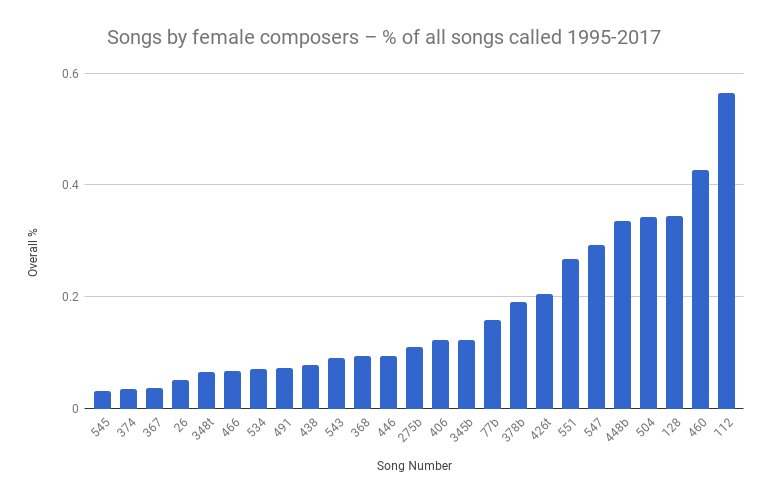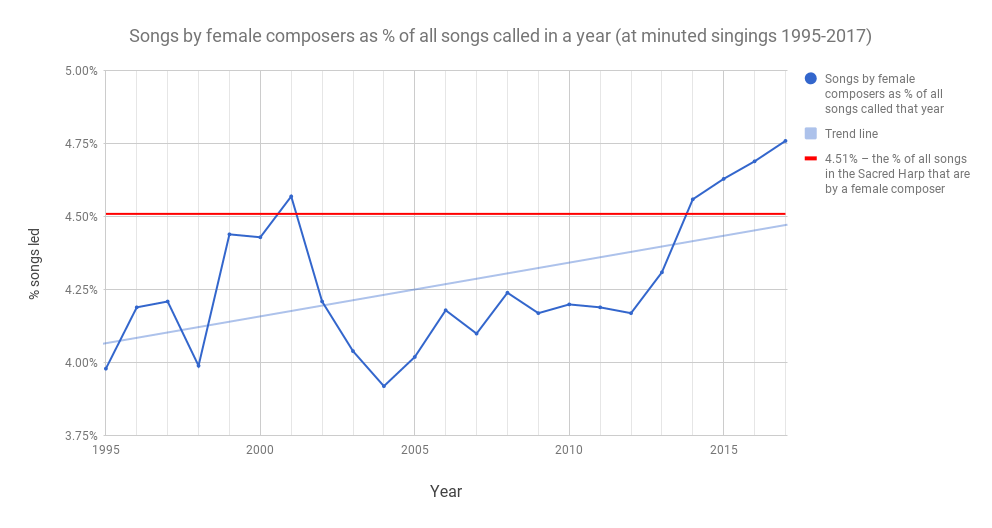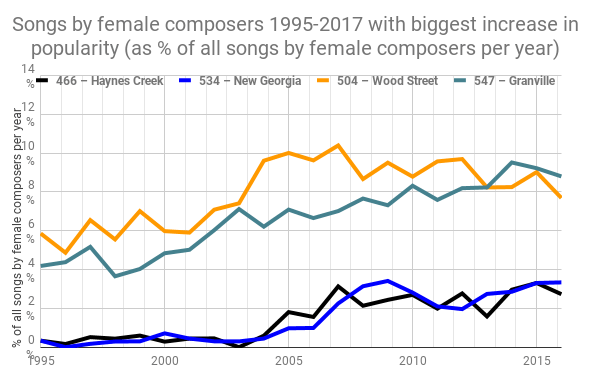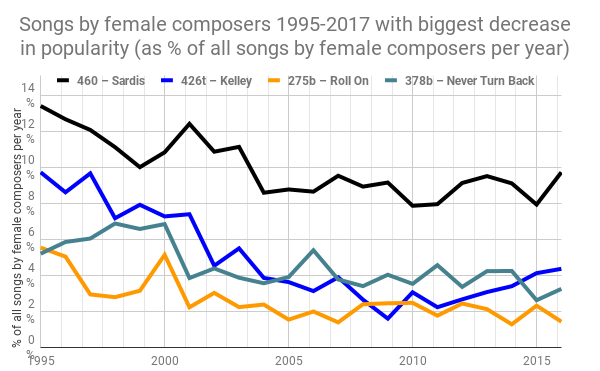Female Composers in the Sacred Harp
Published:
A couple of weeks ago, I was in a Sacred Harp singing school where a new singer asked whether there are female composers in the Sacred Harp. The singing school was in Durham, UK ( shameless plug). I said something like, "Oh yeah there are lots of great songs in here by women." A few days later I thought about the question again for a bit. I realised that although I liked several songs by women, I didn't really have anything to base my answer on.
To rectify that, I've looked at the Sacred Harp and the minutes data to answer some questions that came to mind about female composers in the Sacred Harp. I'm using the 1991 edition of the red "Denson book".
- Who are the female composers in the book?
- Which songs in the book are by female composers?
- What proportion of songs in the book are by female composers?
- What proportion of the composers in the book are female?
- How likely are female composers to have multiple songs in the book?
- How popular are the songs by female composers?
- What are the most popular songs by female composers?
- Has the popularity of songs by female composers changed over time?
- Which songs by female composers have changed the most in the popularity over time?
There's a note at the bottom of this post about how I attributed gender to the composers. The short version is that I used the name given in the book for the composer and didn't get into nuances.
The data I created and used for this is available here as an Excel (.xls) spreadsheet.
Let me know if you see errors, would like some more detail on an answer, or if there are other questions you'd be interested in seeing the answer to.
Who are the female composers in the book? Which songs in the book are by female composers?
In many ways, this is the most interesting question. Here's a list of songs in the book by female composers. Note that the first song in the book is by a woman!
26 Samaria – Maggie Denson Cagle
77b Holcombe – Charlene Wallace
112 The Last Words of Copernicus – Sarah Lancaster
128 The Promised Land – M. Durham
275b Roll On – Cynthia Bass
345b I'm On My Journey Home – Sarah Lancaster
348t Ainslie – Judy Hauff
367 Consolation – Annie Denson Aaron
368 Stony Point – Judy Hauff
374 Oh, Sing With Me! – P. R. Lancaster
378b Never Turn Back – F. E. Parkerson
406 New Harmony – M. L. A. Lancaster
426t Kelley – Amanda Burdette Denson
438 The Marriage in the Skies – Sidney Burdette Denson
446 Infinite Day – Ruth Denson Edwards
448b The Grieved Soul – M. A. Hendon
460 Sardis – Sarah Lancaster
466 Haynes Creek – Joyce Harrison
491 Oh, What Love – Eula Denson Johnson
504 Wood Street – Judy Hauff
534 New Georgia – Ruth Denson Edwards
543 Thou Art God – Ruth Denson Edwards
545 The Pilgrim's Way – Irene Parker Denson
547 Granville – Judy Hauff
551 Jacob's Vision – Margaret Wright
What proportion of songs in the book are by female composers?
4.5% (25) of songs in the book are by female composers. 84.3% (467) of songs are by male composers. 11.2% (62) of songs are by composers of unknown gender.
What proportion of the composers in the book are female?
8.7% (18) of the named composers in the book are female. 91.3% (190) of the named composers are male. I didn't count songs in the book where I couldn't attribute a gender to the composer for this.
How likely are female composers to have multiple songs in the book?
Getting useful averages on how many songs female and male composer have in the book was really hard as the data is really skewed. Small numbers of men and women have a lot more songs than all the other composers of their gender.
This is the best way I could find of describing the data.
17% (3) of female composers and 36% (67) of male composers individually have more than 1 song in the book.
Some composers who have 1 song in the 1991 edition had more songs in earlier editions.
How popular are the songs by female composers?
I used the data from minuted Sacred Harp singings from 1995-2017 to work out how many times each song by a female composer has been called as a proportion of all the songs called.
If all 554 songs in the book were led equally, 4.15% of all songs led in minuted singings would be by female composers. 4.28% of all songs led in minuted singings from 1995-2017 were by female composers. 1 in every 24 songs in the book is by a female composer. 1 in every 23 songs led at a minuted singing from 1995-2017 is by a female composer.
What are the most popular songs by female composers?
If all 554 songs in the book were led equally, each song would be led 0.18% (1 in every 554) of the time. 9 of the 25 songs in the book by female composers are more popular than that.

Here are the songs by female composers sorted by the percentage of all songs led in minuted singing 1995-2017 that that particular song has been led. The percentages are rounded to 2 decimal places. The 1 in N figure is from the unrounded percentage which is why there's a slight discrepancy sometimes.
By comparison, 146 Hallelujah – the song in the book that has been led most often – accounts for 0.8% (1 in every 125) of all songs led 1995-2017.
0.56% (1 in 177) – 112 The Last Words of Copernicus – Sarah Lancaster
0.43% (1 in 235) – 460 Sardis – Sarah Lancaster
0.34% (1 in 290) – 128 The Promised Land – M. Durham
0.34% (1 in 291) – 504 Wood Street – Judy Hauff
0.34% (1 in 298) – 448b The Grieved Soul – M. A. Hendon
0.29% (1 in 341) – 547 Granville – Judy Hauff
0.27% (1 in 374) – 551 Jacob's Vision – Margaret Wright
0.20% (1 in 489) – 426t Kelley – Amanda Burdette Denson
0.19% (1 in 522) – 378b Never Turn Back – F. E. Parkerson
0.16% (1 in 627) – 77b Holcombe – Charlene Wallace
0.12% (1 in 811) – 345b I'm On My Journey Home – Sarah Lancaster
0.12% (1 in 813) – 406 New Harmony – M. L. A. Lancaster
0.11% (1 in 909) – 275b Roll On – Cynthia Bass
0.09% (1 in 1059) – 368 Stony Point – Judy Hauff
0.09% (1 in 1059) – 446 Infinite Day – Ruth Denson Edwards
0.09% (1 in 1093) – 543 Thou Art God – Ruth Denson Edwards
0.08% (1 in 1259) – 438 The Marriage in the Skies – Sidney Burdette Denson
0.07% (1 in 1351) – 491 Oh, What Love – Eula Denson Johnson
0.07% (1 in 1413) – 534 New Georgia – Ruth Denson Edwards
0.07% (1 in 1458) – 466 Haynes Creek – Joyce Harrison
0.07% (1 in 1530) – 348t Ainslie – Judy Hauff
0.05% (1 in 1912) – 26 Samaria – Maggie Denson Cagle
0.04% (1 in 2685) – 367 Consolation – Annie Denson Aaron
0.04% (1 in 2740) – 374 Oh, Sing With Me! – P. R. Lancaster
0.03% (1 in 3095) – 545 The Pilgrim's Way – Irene Parker Denson
Has the popularity of songs by female composers changed over time?
Songs by female composers have become more popular since 1995.
In 1995 – the year where songs by female composers were least popular – 1 in every 25 songs led at a minuted singing was by a female composer. By comparison, in 2017 – when female composers' songs were most popular – 1 in every 21 songs was by a female composer.

Which songs by female composers have changed the most in the popularity over time?
The data here compares the popularity of songs by female composers between a) 1995-1997 and b) 2015-2017 as a 3 year average % of all songs by female composers.
Choosing a 3 year average seemed a bit arbitary but the same songs came out on top whether I compared a 1 year average (1995 vs 2017) or a 2 (1995-1997 vs 2016-2017), 4, or 5 year average. The eight songs below were all in the top 10 for standard deviation in popularity of female composers' song across the full period of 1995-2017. This suggests the popularity of these songs has varied markedly across the full period.
The four songs by female composers that have increased in popularity the most are:
+4.52% – 547 Granville – Judy Hauff
+3.13% – 504 Wood Street – Judy Hauff
+2.93 – 534 New Georgia – Ruth Denson Edwards
+2.84% – 466 Haynes Creek – Joyce Harrison

The four songs that have decreased the most in popularity in that timeframe are:
-4.8% – 460 Sardis – Sarah Lancaster
-4.64% – 426t Kelley – Amanda Burdette Denson
-3.22% – 275b Roll On – Cynthia Bass
-2.74% – 378b Never Turn Back – F. E. Parkerson

How I attributed gender to composers
I used the composer names as given in the book to attribute gender. In general, if Wikipedia says a given name is predominantly used for men then I assumed a composer with that name was male. Clearly, there are some potential issues with that approach.
Some songs in the book give the name for the composer which is not the name of the person who wrote the song. There would be arguments for assigning the song to the original composer rather than the attributed composer but I decided not to get into that.
A song which is attributed in the book to a male composer is counted as being by a male composer even if it was written by a woman. A song which is attributed to a female composer is counted as being by a female composer even if it was written by a man.
Songs where there is no clear composer are counted as unknown, neither male nor female. This accounts for 62 songs. This includes songs where: a) only a surname is given (410t The Dying Californian – Ball), b) a songbook is given as the source of the tune (28t Aylesbury – A Book of Psalmody), and c) no source is given (43 Primrose Hill). I haven't delved into the sources of those tunes but it is very likely that the overwhelming majority of songs in these three groups was written by men.
90 of the composers in the book use their initials instead of their first name. I assumed that they were male unless I found out that they were female. (M. Durham, P. R. Lancaster, and M. L. A. Lancaster are female composers.) It seems particularly likely that I've made mistakes because of this assumption.
Finally, I have doubtless made mistakes in assigning a gender to some of the composers even considering the process above. The data I used is available here as an Excel (.xls) spreadsheet. Let me know if you see any mistakes.